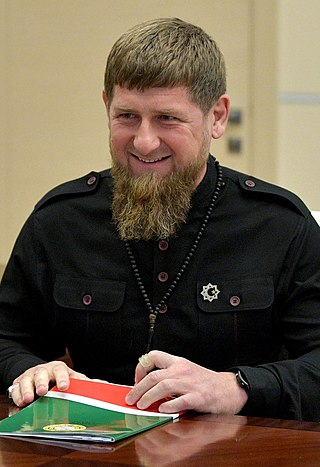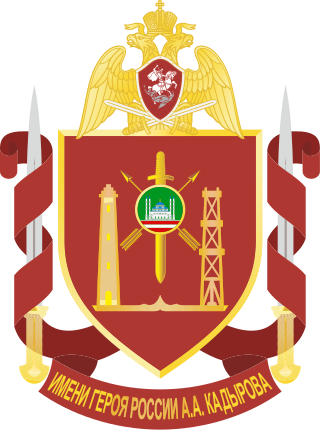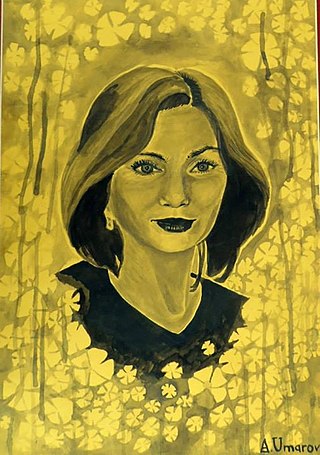Related Research Articles

Akhmed Halidovich Zakayev is a former Deputy Prime Minister and Prime Minister of the unrecognised Chechen Republic of Ichkeria (ChRI). He was also the Foreign Minister of the Ichkerian government, appointed by Aslan Maskhadov shortly after his 1997 election, and again in 2006 by Abdul Halim Sadulayev. During the First Chechen War, Zakayev took part in the battles for Grozny and other military operations, as well as in high-level negotiations with the Russian side.

The Second Chechen War took place in Chechnya and the border regions of the North Caucasus between the Russian Federation and the Chechen Republic of Ichkeria, from August 1999 to April 2009. In August 1999, Islamist fighters from Chechnya infiltrated Russia's Dagestan region, violating Russia's borders. During the initial campaign, Russian military and pro-Russian Chechen paramilitary forces faced Chechen separatists in open combat and seized the Chechen capital Grozny after a winter siege that lasted from December 1999 until February 2000. Russia established direct rule over Chechnya in May 2000 although Chechen militant resistance throughout the North Caucasus region continued to inflict heavy Russian casualties and challenge Russian political control over Chechnya for several years. Both sides carried out attacks against civilians. These attacks drew international condemnation.

Akhmad-Khadzhi Abdulkhamidovich Kadyrov was a Russian politician and revolutionary who served as Chief Mufti of the Chechen Republic of Ichkeria in the 1990s during and after the First Chechen War. At the outbreak of the Second Chechen War he switched sides, offering his service to the Russian government, and later became the President of the Chechen Republic from 5 October 2003, acting as head of administration since July 2000.

Shamil Salmanovich Basayev, also known by his kunya "Abu Idris", was a senior military commander in the Chechen independence movement and terrorist. As a military commander in separatist armed forces of Chechnya, one of his most notable battles was the separatist recapture of Grozny in 1996, which he personally planned and commanded together with Aslan Maskhadov.

Ramzan Akhmadovich Kadyrov is a Russian politician who currently serves as the Head of the Chechen Republic. He was formerly affiliated to the Chechen Independence movement, through his father who was the separatist appointed mufti of Chechnya. He is a colonel general in the Russian military.

Abdul-Halim Abusalamovich Sadulayev was the fourth President of the Chechen Republic of Ichkeria. Sadulayev served little more than a full year as President before being killed in a gun battle with FSB and pro-Russian Chechen forces.
Suleiman Bekmirzayevich Yamadayev was a Chechen rebel commander from the First Chechen War who had switched sides together with his brothers Dzhabrail, Badrudi, Isa and Ruslan in 1999 during the outbreak of the Second Chechen War. He was the commander of the Russian military Special Battalion Vostok unit belonging to the GRU. As such, until 2008, he was officially in command of the biggest pro-Moscow militia outside the control of the current Chechen president Ramzan Kadyrov. From 1 to 22 August 2008 Yamadayev was wanted in Russia on a federal warrant. Nevertheless, he served as one of the Russian military commanders in Russia's war with Georgia during the same period.
Ruslan (Hamzat) Gelayev (Russian: Руслан Гелаев; Chechen: ГелаевгIеран Германи-воI Руслан, romanized: Gelaevhervan Germanivol Ruslan was a prominent commander in the Chechen resistance movement against Russia, in which he played a significant, yet controversial, military and political role in the 1990s and early 2000s. Gelayev was commonly viewed as an abrek and a well-respected, ruthless fighter. His operations spread well beyond the borders of Chechnya and even outside the Russian Federation and into Georgia. He was killed while leading a raid into the Russian Republic of Dagestan in 2004.

The 141st Special Motorized Regiment, also known as the Kadyrovites and the Kadyrovtsy, after Akhmad-Khadzhi Kadyrov, is a paramilitary organization in Chechnya, Russia, that serves as the protection of the Head of the Chechen Republic. The term Kadyrovtsy is commonly used in Chechnya to refer to any armed, ethnically-Chechen men under the control of Head of the Chechen Republic Ramzan Kadyrov - although nominally they are under the umbrella of the National Guard of Russia.

In Chechnya, mass graves containing hundreds of corpses have been uncovered since the beginning of the Chechen wars in 1994. As of June 2008, there were 57 registered locations of mass graves in Chechnya. According to Amnesty International, thousands may be buried in unmarked graves including up to 5,000 civilians who disappeared since the beginning of the Second Chechen War in 1999. In 2008, the largest mass grave found to date was uncovered in Grozny, containing some 800 bodies from the First Chechen War in 1995. Russia's general policy to the Chechen mass graves is to not exhume them.
Human rights violations were committed by the warring sides during the second war in Chechnya. Both Russian officials and Chechen rebels have been regularly and repeatedly accused of committing war crimes including kidnapping, torture, murder, hostage taking, looting, rape, decapitation, and assorted other breaches of the law of war. International and humanitarian organizations, including the Council of Europe and Amnesty International, have criticized both sides of the conflict for blatant and sustained violations of international humanitarian law.

The Republic of Chechnya is a constituent republic, a federal subject of the Russian Federation. It is located in the Caucasus region in south west Russia. It is the political successor of the Checheno-Ingush Autonomous Soviet Socialist Republic. From a centralized form of government during the existence of the Soviet Union, the republic's political system went upheavals during the 1990s with the unrecognized establishment of the Chechen Republic of Ichkeria which led to the wars, the First Chechen War and the Second Chechen War which left the republic in total devastation. In 2000, following Russia's renewed rule, a local, republican form of government was established in the republic under the control of the Russian federal government.
The Borozdinovskaya operation was a zachistka-type operation by Russian forces in Borozdinovskaya, Chechnya, on June 4, 2005, during the Second Chechen War. Members of the Special Battalion Vostok, an ethnic Chechen Spetsnaz unit of the Russian GRU, killed or disappeared 12 people in the ethnic minority Avar village of Borozdinovskaya, near the border with the Dagestan. Representatives of the Russian federal authorities expressed outrage over the incident, and the commander of the unit responsible was convicted.

Special Battalions Vostok and Zapad were two Spetsnaz units of the GRU, the military intelligence agency of Russia, based in Chechnya. The overwhelming majority of the personnel were ethnic Chechens, while the command personnel were mixed ethnic Russians and Chechens. The Special Battalions were formed during the Second Chechen War as a force of Chechen volunteers under the direct control of the Russian government to perform operations in the mountain-forests of Chechnya. The two units operated independently from each other, with Zapad covering the western half of Chechnya and Vostok covering the eastern half, and their own commanders subordinate to the GRU but under the command network of the 42nd Guards Motor Rifle Division.

Natalya Khusainovna Estemirova was a Russian human rights activist and board member of the Russian human rights organization Memorial. Estemirova was abducted by unknown persons on 15 July 2009 around 8:30 a.m. from her home in Grozny, Chechnya, as she was working on "extremely sensitive" cases of human rights abuses in Chechnya. Two witnesses reported they saw Estemirova being pushed into a car shouting that she was being abducted. Her remains were found with bullet wounds in the head and chest area at 4:30 p.m. in woodland 100 metres (330 ft) away from the federal road "Kavkaz" near the village of Gazi-Yurt, Ingushetia.
The 2010 Chechen Parliament attack took place on the morning of 19 October 2010, when three Chechen militants attacked the parliament complex in Grozny, the capital of the Chechen Republic, a federal subject of Russia. At least six people were killed, including two police officers, one parliament employee and all three suicide commandos.
Khuseyn Vakhaevich Gakayev, also known as Emir Mansur and Emir Hussein, was a mujahid Emir (commander) fighting in Chechnya. He was one of the most senior field commanders still operating in the North Caucasus prior to his death on 24 January 2013.
References
- ↑ Cleansing operations in the Kurchaloyevskiy region (June 2001) Archived 2012-02-17 at the Wayback Machine , Memorial, 2001
- ↑ Her Own Death, Foretold, Washington Post , October 15, 2006
- ↑ Inside the torture chambers of Grozny [ dead link ], The Telegraph , 21 October 2006
- ↑ MEMORIAL DESCRIBES “MEDIEVAL” JUSTICE IN CHECHNYA Archived 2008-05-06 at the Wayback Machine